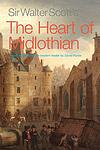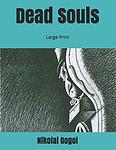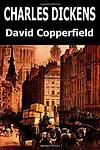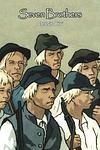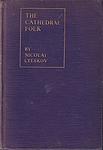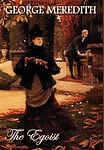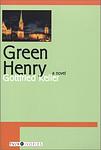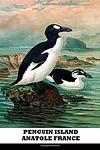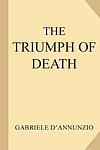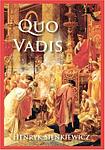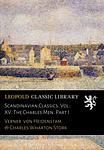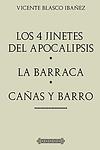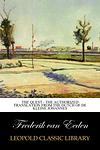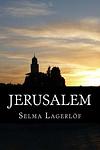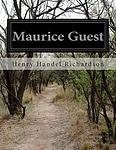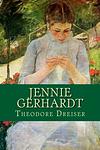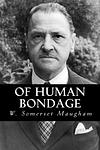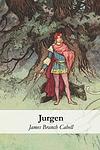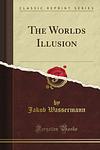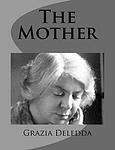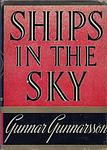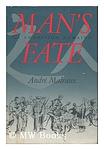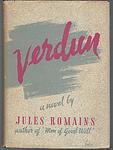William H. F. Lamont’s 100 Best Novels (1947)
This is one of the 286 lists we use to generate our main The Greatest Books list.
-
Don Quixote by Miguel de Cervantes
This classic novel follows the adventures of a man who, driven mad by reading too many chivalric romances, decides to become a knight-errant and roam the world righting wrongs under the name Don Quixote. Accompanied by his loyal squire, Sancho Panza, he battles windmills he believes to be giants and champions the virtuous lady Dulcinea, who is in reality a simple peasant girl. The book is a richly layered critique of the popular literature of Cervantes' time and a profound exploration of reality and illusion, madness and sanity.
-
Manon Lescaut by Abbe Prevost
"Manon Lescaut" is a tragic novel about a young man of good family who sacrifices everything for his passionate love for a beautiful but deceitful woman, Manon. Despite his sincere love for Manon, she continually betrays him for wealth and comfort, leading to their downfall. The story is a cautionary tale about the destructive power of obsessive love and the tragic consequences of a lack of moral strength and self-discipline.
-
Tom Jones by Henry Fielding
This classic novel tells the story of Tom Jones, a charming and good-hearted but impulsive young man, who is expelled from his adoptive family home due to his wild behavior and love for the beautiful Sophia Western. His journey through 18th-century England is filled with adventures, misadventures, and a colorful cast of characters, as he struggles with his identity and seeks redemption. The narrative explores themes of class, virtue, and morality, and is known for its humor, social satire, and vivid characterization.
-
Candide by Voltaire
"Candide" is a satirical novel that follows the adventures of a young man, Candide, who is living a sheltered life in an Edenic paradise and being indoctrinated with Leibnizian optimism by his mentor. When he is expelled from the paradise for kissing a baron's daughter, he embarks on a journey around the world, witnessing the horrors of war, natural disasters, and human cruelty. Throughout his journey, Candide maintains his optimistic philosophy, despite the constant hardships he faces, ultimately concluding that one must cultivate their own garden, a metaphor for taking control of one's own destiny.
-
Dangerous Liaison by Pierre Choderlos de Laclos
"Dangerous Liaison" is a tale of manipulation, revenge, and seduction set in the French aristocracy before the French Revolution. The novel follows the Marquise de Merteuil and the Vicomte de Valmont, two rivals who use sex as a weapon to humiliate and degrade others, all the while enjoying their cruel games. Their targets are the virtuous (and married) Madame de Tourvel and the young Cecile de Volanges. The book is a dramatic exploration of decadence, corruption, and ultimate retribution.
-
Wilhelm Meister's Apprenticeship by Johann Wolfgang von Goethe
"Wilhelm Meister's Apprenticeship" is a classic coming-of-age story that follows the protagonist, Wilhelm, through his journey of self-discovery. Caught between his bourgeois background and his aspirations to become an actor, Wilhelm embarks on an odyssey that introduces him to a variety of characters and experiences. The novel explores themes of love, loss, and the pursuit of artistic excellence, while also critiquing the social norms and expectations of the time.
-
Pride and Prejudice by Jane Austen
Set in early 19th-century England, this classic novel revolves around the lives of the Bennet family, particularly the five unmarried daughters. The narrative explores themes of manners, upbringing, morality, education, and marriage within the society of the landed gentry. It follows the romantic entanglements of Elizabeth Bennet, the second eldest daughter, who is intelligent, lively, and quick-witted, and her tumultuous relationship with the proud, wealthy, and seemingly aloof Mr. Darcy. Their story unfolds as they navigate societal expectations, personal misunderstandings, and their own pride and prejudice.
-
The Heart Of Midlothian by Sir Walter Scott
The novel is a historical tale set in 18th-century Scotland, revolving around Jeanie Deans, a young woman of strong moral character, who embarks on a daunting journey from Edinburgh to London to seek a royal pardon for her wrongfully accused sister, Effie, who faces execution. Along the way, Jeanie encounters various characters from different strata of society, confronting issues of justice, morality, and national identity. Her steadfast loyalty and unwavering principles highlight the cultural and social tensions of the time, as the narrative intertwines personal drama with broader historical events, including the Porteous Riots and the influence of the Scottish Reformation.
-
The Betrothed by Alessandro Manzoni
"The Betrothed" is a historical novel set in Lombardy, Italy during the 17th century, in the midst of political and religious turmoil. The story follows the journey of two peasants, Renzo and Lucia, who are in love and wish to marry. However, their plans are thwarted by a corrupt local baron who desires Lucia for himself, and a cowardly priest who refuses to stand up to the baron. The couple are forced to flee, facing numerous hardships and adventures, while their faith and love for each other are continually tested. The novel explores themes of love, faith, and the struggle for justice.
-
The Red and the Black by Stendhal
The novel is a detailed psychological portrait of Julien Sorel, a young man from a provincial background who aspires to rise above his humble beginnings. He uses his intelligence and hypocrisy to advance in the post-Napoleonic French society, which is deeply divided by class and political loyalties. The story is a critique of the society's materialism and hypocrisy as Julien's ambitions lead him to a tragic end. The title refers to the contrasting uniforms of the army and the church, the two routes available to him for upward mobility.
-
Father Goriot by Honoré de Balzac
"Father Goriot" is a classic French novel that explores the themes of wealth, power, love, and social status in 19th century Paris. The narrative follows the lives of three main characters: a young, ambitious law student who seeks to rise above his modest background; an elderly, once-wealthy man who has sacrificed everything for his two ungrateful daughters; and a crafty, ruthless criminal who manipulates others for his own gain. Their stories intertwine in a boarding house, revealing the harsh realities of Parisian society and the destructive power of unchecked ambition and selfishness.
-
A Hero of Our Time by Mikhail Lermontov
"A Hero of Our Time" is a novel that follows the life of a young, charismatic, yet cynical and emotionally detached Russian officer, who serves in the Caucasus region. The story is told through a series of narratives, including the officer's own journal entries, revealing his manipulative and self-destructive tendencies. The novel explores themes of disillusionment, morality, and the nature of heroism in the 19th century Russian society.
-
Dead Souls by Nikolai Gogol
In this satirical novel, a man travels through Russia buying up the titles to deceased serfs (or "souls") from their naive landowners, under the guise of a get-rich-quick scheme. However, his real plan is to use these "dead souls" to create a phantom estate and secure a massive loan. The story explores the corruption and greed prevalent in 19th-century Russian society and provides a unique perspective on the human condition.
-
Cousin Bette by Honoré de Balzac
"Cousin Bette" is a novel set in mid-19th century Paris, focusing on the lives of the Hulot family and their cousin, Bette, an old maid who harbors a deep resentment towards her relatives due to their wealth and social status. When Bette learns that her cousin's husband is having an affair, she decides to exact revenge by manipulating various characters and situations, leading to the downfall of the Hulot family. The novel explores themes of jealousy, revenge, and the destructive power of repressed feelings.
-
Jane Eyre by Charlotte Bronte
The novel follows the life of Jane Eyre, an orphan who is mistreated by her relatives and sent to a charity school. As she grows up, Jane becomes a governess at Thornfield Hall, where she falls in love with the brooding and mysterious Mr. Rochester. However, she soon learns of a dark secret in his past that threatens their future together. The story is a profound exploration of a woman's self-discovery and her struggle for independence and love in a rigid Victorian society.
-
Wuthering Heights by Emily Brontë
This classic novel is a tale of love, revenge and social class set in the Yorkshire moors. It revolves around the intense, complex relationship between Catherine Earnshaw and Heathcliff, an orphan adopted by Catherine's father. Despite their deep affection for each other, Catherine marries Edgar Linton, a wealthy neighbor, leading Heathcliff to seek revenge on the two families. The story unfolds over two generations, reflecting the consequences of their choices and the destructive power of obsessive love.
-
Vanity Fair by William Makepeace Thackeray
This classic novel follows the lives of two contrasting women, the cunning and ruthless Becky Sharp and the sweet and naive Amelia Sedley, against the backdrop of English society during the Napoleonic Wars. The book is a satirical exploration of the obsession with wealth, status, and social climbing, and the moral bankruptcy that can result from such pursuits. The narrative weaves an intricate tale of love, betrayal, and redemption, exposing the vanity and hypocrisy of high society.
-
David Copperfield by Charles Dickens
This novel follows the life of its titular protagonist from his childhood to maturity. Born to a young widow, David endures a difficult childhood when his mother remarries a harsh and abusive man. After his mother's death, he is sent to a boarding school before being forced into child labor. As he grows, David experiences hardship, love, and loss, all the while meeting a colorful array of characters. The novel is a journey of self-discovery and personal growth, showcasing the harsh realities of 19th-century England.
-
The Scarlet Letter by Nathaniel Hawthorne
Set in 17th-century Puritan Boston, this novel tells the story of a woman who conceives a daughter through an affair and struggles to create a new life of repentance and dignity. She is forced to wear a scarlet "A" on her dress as a sign of her adultery while her lover, a revered local minister, remains unnamed and unpunished. Throughout the book, themes of sin, legalism, and guilt are explored.
-
Moby Dick by Herman Melville
The novel is a detailed narrative of a vengeful sea captain's obsessive quest to hunt down a giant white sperm whale that bit off his leg. The captain's relentless pursuit, despite the warnings and concerns of his crew, leads them on a dangerous journey across the seas. The story is a complex exploration of good and evil, obsession, and the nature of reality, filled with rich descriptions of whaling and the sea.
-
The History Of Henry Esmond by William Makepeace Thackeray
The novel is a historical fiction set in the late 17th and early 18th centuries, chronicling the life of its protagonist, an officer in the English army. Born to uncertain parentage, he is raised by a noble family and develops a deep affection for his benefactors' daughter. The narrative follows his experiences in the military, his travels abroad, and his involvement in the political and religious conflicts of the era, including the Jacobite Rebellion. Throughout his life, he grapples with questions of honor, love, and identity, against the backdrop of the shifting fortunes of the British monarchy and the complexities of the society in which he lives.
-
Madame Bovary by Gustave Flaubert
Madame Bovary is a tragic novel about a young woman, Emma Bovary, who is married to a dull, but kind-hearted doctor. Dissatisfied with her life, she embarks on a series of extramarital affairs and indulges in a luxurious lifestyle in an attempt to escape the banalities and emptiness of provincial life. Her desire for passion and excitement leads her down a path of financial ruin and despair, ultimately resulting in a tragic end.
-
Oblomov by Ivan Goncharov
The book is a satirical critique of the nobility in 19th century Russia, focusing on the titular character, a lazy and apathetic nobleman who prefers to daydream and live in his own fantasies rather than engage with the real world. His indolence is contrasted with the energetic and ambitious character of his friend who tries to get him involved in societal affairs and business. The protagonist's lethargy and inability to adapt to changing times symbolize the decay and stagnation of the Russian nobility.
-
Adam Bede by George Eliot
"Adam Bede" is a 19th-century novel set in rural England that explores the themes of love, betrayal, and moral responsibility. The story revolves around a hardworking carpenter, Adam Bede, who is in love with a vain but beautiful dairymaid, Hetty Sorrel. However, Hetty is seduced by a young, thoughtless squire, Arthur Donnithorne, which leads to her becoming pregnant. When Arthur abandons her, Hetty leaves her baby in the woods, where it dies, and she is subsequently charged with infanticide. Adam, devastated by Hetty's actions, finds solace and eventually love with a devout Methodist preacher, Dinah Morris. The novel ends with Adam and Dinah marrying, finding happiness after the tragedy.
-
Great Expectations by Charles Dickens
A young orphan boy, living with his cruel older sister and her kind blacksmith husband, has an encounter with an escaped convict that changes his life. Later, he becomes the protégé of a wealthy but reclusive woman and falls in love with her adopted daughter. He then learns that an anonymous benefactor has left him a fortune, leading him to believe that his benefactor is the reclusive woman and that she intends for him to marry her adopted daughter. He moves to London to become a gentleman, but his great expectations are ultimately shattered when he learns the true identity of his benefactor and the reality of his love interest.
-
Les Misérables by Victor Hugo
Set in early 19th-century France, the narrative follows the lives and interactions of several characters, particularly the struggles of ex-convict Jean Valjean and his journey towards redemption. The story touches upon the nature of law and grace, and elaborates upon the history of France, architecture of Paris, politics, moral philosophy, antimonarchism, justice, religion, and the types and nature of romantic and familial love. It is known for its vivid and relatable characters, and its exploration of societal and moral issues.
-
Fathers and Sons by Ivan Turgenev
This classic novel explores the generational divide and ideological clash in 19th century Russia. The story focuses on the relationship between a liberal father and his nihilistic son, who challenges the traditional values and beliefs of his elders. As they navigate their personal differences, the novel delves into broader themes of progress, love, and societal change, offering a poignant commentary on the tension between old and new ideas in a rapidly changing world.
-
Crime and Punishment by Fyodor Dostoevsky
A young, impoverished former student in Saint Petersburg, Russia, formulates a plan to kill an unscrupulous pawnbroker to redistribute her wealth among the needy. However, after carrying out the act, he is consumed by guilt and paranoia, leading to a psychological battle within himself. As he grapples with his actions, he also navigates complex relationships with a variety of characters, including a virtuous prostitute, his sister, and a relentless detective. The narrative explores themes of morality, redemption, and the psychological impacts of crime.
-
War and Peace by Leo Tolstoy
Set in the backdrop of the Napoleonic era, the novel presents a panorama of Russian society and its descent into the chaos of war. It follows the interconnected lives of five aristocratic families, their struggles, romances, and personal journeys through the tumultuous period of history. The narrative explores themes of love, war, and the meaning of life, as it weaves together historical events with the personal stories of its characters.
-
Seven Brothers by Aleksis Kivi
This classic novel from Finnish literature tells the story of seven brothers who struggle with societal norms and expectations in 19th-century Finland. The brothers, living on their ancestral farm, are unruly and resistant to education and religious conformity, leading them into conflicts with local villagers. Opting for a life of independence and freedom, they retreat into the wilderness, where they face the challenges of survival and the process of self-discovery. Through their adventures and misadventures, the novel explores themes of individualism, brotherhood, and the tension between civilization and nature, all while celebrating the Finnish language and landscape.
-
The Cathedral Folk by Nikolai Leskov
"The Cathedral Folk" is a novel set in 19th-century Russia, revolving around the lives of the people connected to the construction of a grand cathedral. The narrative delves into the intricacies of Russian society, exploring themes of faith, tradition, and the conflicts between progress and the preservation of the old ways. Through a rich tapestry of characters, including craftsmen, clergy, and local gentry, the book examines the human spirit and the complexities of moral choices in a time of social change, all while painting a vivid picture of Russian provincial life with its unique blend of piety, superstition, and the struggle for personal redemption.
-
Doña Perfecta by Benito Pérez Galdós
This novel is a vivid portrayal of the clash between progress and tradition, set in a fictional Spanish town. The story centers around a young engineer who arrives with ideas of modernization and progress, only to find himself in conflict with the conservative and deeply religious values upheld by his aunt, the titular character, and the town's society. This conflict escalates into a dramatic struggle that exposes the hypocrisy, intolerance, and moral rigidity of the town, ultimately leading to tragic consequences. Through this narrative, the novel critiques the resistance to change and the destructive nature of fanaticism, reflecting broader social tensions within Spain during the 19th century.
-
Anna Karenina by Leo Tolstoy
Set in 19th-century Russia, this novel revolves around the life of Anna Karenina, a high-society woman who, dissatisfied with her loveless marriage, embarks on a passionate affair with a charming officer named Count Vronsky. This scandalous affair leads to her social downfall, while parallel to this, the novel also explores the rural life and struggles of Levin, a landowner who seeks the meaning of life and true happiness. The book explores themes such as love, marriage, fidelity, societal norms, and the human quest for happiness.
-
L'assommoir by Émile Zola
The novel is a gritty portrayal of working-class life in 19th-century Paris, focusing on the struggles of Gervaise Macquart, a laundress who aspires to a better life. After her lover abandons her with two children, she marries a roofer, Coupeau, and they initially find happiness and modest prosperity. However, their lives spiral downward due to alcoholism, poverty, and the harsh realities of their social environment. The narrative delves into the impact of addiction on family dynamics and the broader community, painting a vivid and unflinching picture of the urban poor's descent into despair and degradation.
-
The Return of the Native by Thomas Hardy
This classic novel is set in the rustic rural backdrop of Egdon Heath and revolves around the life of Clym Yeobright, a successful diamond merchant who returns to his native land from Paris. His return sparks a chain of events involving love, ambition, betrayal, and tragedy. His love interest, Eustacia Vye, dreams of escaping the monotonous rural life, while his mother disapproves of their relationship. The novel explores the themes of love, fate, chance, and the clash between individuals' aspirations and societal expectations.
-
The Egoist by George Meredith
The novel is a satirical portrayal of Victorian society and its marriage customs, focusing on the story of a self-absorbed, wealthy gentleman who is blind to his own egotism and the effects it has on those around him. His misguided attempts at courtship and his inability to understand the needs and feelings of others, particularly the intelligent and independent woman he wishes to marry, lead to a series of comedic and dramatic misunderstandings. The narrative delves into themes of love, self-knowledge, and the struggle for personal freedom, all while critiquing the social norms and gender roles of the time.
-
The Brothers Karamazov by Fyodor Dostoevsky
This classic novel explores the complex, passionate, and troubled relationship between four brothers and their father in 19th century Russia. The narrative delves into the themes of faith, doubt, morality, and redemption, as each brother grapples with personal dilemmas and family conflicts. The story culminates in a dramatic trial following a murder, which serves as a microcosm of the moral and philosophical struggles faced by each character, and by extension, humanity itself.
-
Green Henry by Gottfried Keller
"Green Henry" is a semi-autobiographical novel that chronicles the life of a young man who dreams of becoming a painter but faces countless obstacles on his journey. The protagonist leaves his Swiss village and travels to Munich to study art, but his lack of discipline and financial difficulties force him to return home. After his mother's death, he begins to reassess his life and eventually finds his place in society. The novel explores themes of identity, ambition, and the struggle between individual desires and societal expectations.
-
The Golovlyov Family by Mikhail Saltykov-Shchedrin
The book is a bleak portrayal of a declining Russian noble family in the 19th century, focusing on the despotic and miserly matriarch, Arina Petrovna, and her offspring, who are plagued by vice and selfishness. The narrative delves into the moral decay and hypocrisy of the family members, particularly highlighting the cruel and cunning son, Porfiry, as he manipulates and exploits those around him to gain power. Set against the backdrop of a changing Russia, the story serves as a scathing critique of the societal and spiritual failings of the Russian gentry, illustrating the corrosive effects of greed and moral bankruptcy.
-
I Malavoglia by Giovanni Verga
"I Malavoglia" is a tragic tale of a poor Sicilian family who struggles to maintain their dignity and values in the face of poverty, death, and societal pressure. The family's patriarch is determined to keep their ancestral home and to improve their lot through hard work and sacrifice. However, their efforts are thwarted by a series of unfortunate events, including the loss of their fishing boat, the death of family members, and the dishonor of their only daughter. Despite these hardships, the family perseveres, embodying the resilience and determination of the Sicilian people.
-
The Portrait of a Lady by Henry James
This classic novel explores the life of a young, independent American woman who inherits a large amount of money and moves to Europe, where she falls into a manipulative and oppressive marriage. The story delves into themes of personal freedom, responsibility, and betrayal, as the protagonist navigates the complexities of high society, love, and the consequences of her choices.
-
The Adventures of Huckleberry Finn by Mark Twain
The novel follows the journey of a young boy named Huckleberry Finn and a runaway slave named Jim as they travel down the Mississippi River on a raft. Set in the American South before the Civil War, the story explores themes of friendship, freedom, and the hypocrisy of society. Through various adventures and encounters with a host of colorful characters, Huck grapples with his personal values, often clashing with the societal norms of the time.
-
The Rise Of Silas Lapham by William Dean Howells
The novel centers around the moral and ethical journey of Silas Lapham, a self-made businessman who rises from rural Vermont origins to become a wealthy paint manufacturer in Boston. As Lapham grapples with the social expectations and responsibilities that accompany his newfound status, he faces a series of personal and financial challenges that test his integrity. His desire to integrate into high society and secure advantageous marriages for his daughters leads to a clash between the values of material success and moral rectitude. Throughout the story, Lapham's character is explored through his interactions with the aristocratic Corey family, highlighting the tensions between the old and new elite in American society.
-
Thaïs by Anatole France
"Thaïs" is a historical novel set in Egypt during the 4th century, revolving around a beautiful and hedonistic courtesan, and a Christian ascetic monk who becomes obsessed with her. The monk, seeking to save her soul, convinces her to abandon her life of luxury and pleasure to live in a convent as a penitent. However, as she finds peace and salvation in her new life, the monk is tormented by his repressed desires and lust for her, ultimately leading to his own spiritual downfall. The novel explores themes of desire, faith, and the destructive power of obsession.
-
Niels Lyhne by Jens Peter Jacobson
The novel is a coming-of-age story that follows the intellectual and emotional development of its eponymous protagonist, a young Danish poet who struggles with the existential dilemmas of his time. Throughout his life, he grapples with the loss of religious faith, the search for meaning in a secular world, and the pursuit of artistic truth, all while experiencing the pangs of unrequited love and personal tragedy. The protagonist's journey is one of self-discovery and disillusionment, as he seeks to reconcile his idealistic visions with the harsh realities of life, ultimately embodying the spirit of a modern, introspective individual facing the existential uncertainties of the 19th century.
-
Eros Invincible by Ricarda Huch
"Eros Invincible" is a compelling exploration of the complexities of love, delving into its transformative power over individuals and society. Through a series of vivid narratives and insightful character studies, the book examines the various manifestations of love, from passionate romantic relationships to the deep bonds of friendship and familial affection. The author masterfully weaves historical context and philosophical musings into the personal stories of the characters, presenting a rich tapestry that celebrates the invincible nature of love in all its forms. With its lyrical prose and deep emotional resonance, this work challenges readers to consider the enduring impact of love on the human spirit and the fabric of society.
-
The Triumph Of Death by Gabriele D'Annunzio
This novel delves into the life of Giorgio Aurispa, a man who, amidst the decadence of Italian society, embarks on a journey of self-discovery and existential questioning. Through his relationships, particularly with the enigmatic Ippolita Sanzio, and his experiences across various European locales, Giorgio confronts themes of love, death, and the search for meaning. The narrative, rich with symbolic imagery and poetic language, explores the depths of human emotion and the inevitable confrontation with mortality, culminating in a profound exploration of the human condition and the pervasive sense of disillusionment that characterized the turn of the century.
-
Effi Briest by Theodor Fontane
This novel explores the life of a 17-year-old girl who is married off to a much older man, a high-ranking official, for the sake of social and financial stability. Despite her husband's devotion, she embarks on a passionate, but doomed affair with a charming, yet manipulative, major. The affair ends disastrously, leading to her social ostracization and eventual descent into loneliness and despair. The book serves as a critique of the rigid Prussian society of the late 19th century.
-
Quo Vadis by Henryk Sienkiewicz
Set in ancient Rome during the reign of Emperor Nero, "Quo Vadis" follows the love story of a young Christian woman Lygia and a Roman patrician, Marcus Vinicius. As their relationship blossoms, they must navigate the dangerous political climate of the time, marked by Nero's tyranny and the growing influence of Christianity. The novel provides a vivid depiction of the clash between pagan Rome and the early Christian church, culminating in the Great Fire of Rome and subsequent persecution of Christians.
-
The Patriot by Antonio Fogazzaro
This novel, set in Italy during the latter half of the 19th century, weaves a compelling narrative around the life of its protagonist, a nobleman deeply involved in the Italian unification process. The story delves into his internal conflicts and moral dilemmas as he navigates the turbulent political landscape of the time, striving to reconcile his patriotic fervor with his personal beliefs and relationships. The book explores themes of love, faith, and the struggle for political change, offering a nuanced portrayal of the complexities faced by individuals caught in the throes of national upheaval. Through its rich character development and evocative depiction of historical events, the novel provides a poignant exploration of the human condition amidst the backdrop of significant societal transformation.
-
The Charles Men by Verner von Heidenstam
This historical novel offers a panoramic view of Sweden during the Great Northern War, focusing on the reign of Charles XII and the profound impact of his military campaigns across Europe. Through a series of vividly drawn characters, both real and fictional, the narrative explores themes of patriotism, the futility of war, and the clash between old and new societal values. The book delves into the personal and political challenges faced by those who lived through this tumultuous period, presenting a rich tapestry of heroism, tragedy, and the enduring human spirit. Its detailed portrayal of 17th and 18th-century Scandinavian life, combined with a deep reflection on the nature of leadership and national identity, makes it a significant work in the realm of historical fiction.
-
La Barraca by Vicente Blasco Ibáñez
This novel is a poignant portrayal of the struggles faced by a family who moves to the Valencian countryside to take over an abandoned farm, only to be met with hostility from the local community. The narrative delves into themes of social injustice, the harsh realities of rural life, and the relentless battle against nature's whims. As the family endeavors to cultivate the land and integrate into the community, they encounter resistance and sabotage from neighbors who resent their presence. The story is a vivid depiction of human resilience and the pursuit of hope amidst adversity, set against the backdrop of the fertile but unforgiving Spanish landscape.
-
Lord Jim by Joseph Conrad
The novel revolves around a young, idealistic British seaman, who commits a crime of cowardice at sea. He abandons his ship, leaving hundreds of passengers to their fate. He is publicly censured for this act and spends the rest of his life in shameful obscurity in the South Seas, trying to repress the guilt of his past and regain his lost honor. His quest for redemption leads him to a remote island where he gets a chance to prove his courage, but his tragic flaw ultimately leads to his downfall.
-
Sotileza by Jose M. de Pereda
This novel is a vivid portrayal of 19th-century life in the Spanish fishing village of Santander, focusing on the life and struggles of its protagonist, a young woman nicknamed "Sotileza." Through her story, the narrative delves into themes of love, honor, and the harsh realities of the working class, set against the backdrop of the sea which plays a central role in the community's livelihood. The author masterfully captures the dialect, customs, and daily life of the villagers, providing a detailed and affectionate depiction of the Cantabrian people and their traditions. Through its rich character development and evocative setting, the novel offers a poignant exploration of human resilience and the pursuit of happiness amidst societal constraints.
-
The Quest by Frederik van Eeden
"The Quest" is a philosophical novel that delves into the journey of a man in search of truth and purpose in life. The protagonist, disillusioned with the materialistic society around him, embarks on a spiritual quest for enlightenment. His journey takes him through various experiences and encounters with different belief systems and philosophies, challenging his existing notions and beliefs. The book explores themes of existentialism, spirituality, and the human struggle for meaning.
-
Jerusalem by Selma Lagerlöf
This book is a profound exploration of faith, tradition, and the quest for spiritual fulfillment, set against the backdrop of rural Sweden and the Holy Land in the late 19th century. It tells the story of a group of Swedish peasants, inspired by religious fervor, who decide to abandon their homeland and emigrate to Jerusalem to live a purer life in the city of Jesus. The narrative delves into the lives of these individuals, examining their motivations, struggles, and the impact of their decision on the loved ones they leave behind. Through its vivid portrayal of contrasting landscapes and cultures, the novel examines themes of community, belief, and the search for a spiritual homeland, making it a timeless tale of human aspiration and longing.
-
Buddenbrooks by Thomas Mann
"Buddenbrooks" is a novel that chronicles the decline of a wealthy north German merchant family over the course of four generations. The narrative focuses on the fluctuating fortunes and internal struggles of the family, reflecting the societal changes and economic decline of the period. The family's personal and business relationships, their moral values, and their struggle to maintain social status are all explored against the backdrop of the changing political and social landscape.
-
Rebellion In The Backlands by Euclides da Cunha
This book offers a detailed and vivid account of the War of Canudos, a significant peasant revolt that took place in the late 19th century in the Brazilian backlands. Through a blend of historical documentation and narrative, the text explores the socio-political conditions that led to the uprising, the charismatic leadership of Antônio Conselheiro, and the brutal suppression of the rebellion by the Brazilian government. The author delves into the geography, culture, and lives of the backland inhabitants, providing a deep analysis of the conflict as a reflection of the broader struggles within Brazilian society. This work is not only a historical account but also a profound commentary on the themes of civilization versus barbarism, social injustice, and the complexities of national identity.
-
Ashes by Stefan Zeromski
This novel is a poignant exploration of the Polish struggle for independence in the late 19th and early 20th centuries, focusing on the life and experiences of its protagonist, a Polish aristocrat. Set against the backdrop of the partitioned Poland, the narrative delves into themes of love, loyalty, and the quest for national identity. The protagonist's journey is marked by personal loss and the harsh realities of a country under foreign domination, reflecting the broader socio-political turmoil of the era. Through its vivid portrayal of historical events and emotional depth, the novel offers a compelling insight into the resilience of the human spirit and the complex tapestry of Polish history.
-
Old People And The Things That Pass by Louis Couperus
This novel delves into the hidden secrets and unspoken truths of an elderly couple, revealing the profound impact of their concealed affair on their family across generations. As the narrative unfolds, it exposes the complexities of human relationships and the consequences of past actions, illustrating how secrets can ripple through time, affecting not just those who keep them but also their descendants. The story masterfully explores themes of guilt, redemption, and the inescapable nature of the past, all while painting a poignant picture of aging and the inevitable passage of time.
-
The Old Wives' Tale by Arnold Bennett
This novel explores the lives of two sisters, Constance and Sophia Baines, who are brought up in a small town drapery shop in the mid-19th century. Constance remains in their hometown, marries and leads a relatively uneventful life, while Sophia elopes to Paris with a traveling salesman, living through the Siege of Paris and the Franco-Prussian War. The book contrasts the sisters' different experiences and how their choices shape their lives, ultimately reuniting them in their old age.
-
Maurice Guest by Henry Handel Richardson
This novel is a compelling exploration of obsessive love set against the backdrop of a German conservatory in the early 20th century. It follows the story of an Englishman, who, aspiring to become a musician, moves to Leipzig to study. There, he becomes infatuated with an Australian woman, a fellow student, who is emotionally entangled with another man. The narrative delves deep into the complexities of human emotions, the destructive nature of unrequited love, and the protagonist's descent into obsession. Through its vivid portrayal of characters and setting, the book offers a poignant examination of the darker aspects of love and the human psyche.
-
The Peasants by Władysław Reymont
The book is a monumental narrative that delves into the lives, traditions, and struggles of the rural population in Poland at the turn of the 20th century. Through vivid and detailed storytelling, it portrays the seasonal rhythms that dictate the peasants' work and celebrations, their relationship with nature and the land, and the social dynamics within their community. The narrative not only offers a richly textured depiction of peasant life but also critically examines the impact of modernity and social change on traditional ways of life. Through its intricate character studies and the depiction of the universal themes of love, jealousy, ambition, and conflict, the novel presents a comprehensive and empathetic portrayal of the human condition within a specific cultural and historical context.
-
The Fool In Christ: Emmanuel Quint by Gerhart Hauptmann
This novel delves into the life of Emmanuel Quint, a man who, amidst the turmoil of early 20th-century Germany, believes himself to be a modern-day messiah. His profound spiritual convictions and miraculous healings draw a fervent following, yet also attract scorn and skepticism from society and religious authorities. As he embarks on a tumultuous journey of faith, Quint's radical teachings and the controversies surrounding his actions challenge the established norms and beliefs of the time, leading to profound reflections on spirituality, morality, and the nature of divinity. The narrative explores the fine line between madness and sanctity, ultimately questioning the essence of truth and redemption in a world resistant to change.
-
Jennie Gerhardt by Theodore Dreiser
This novel tells the poignant story of Jennie Gerhardt, a young woman of humble origins who, through a series of unfortunate circumstances and societal pressures, becomes involved with two different men of higher social standing throughout her life. Set against the backdrop of late 19th-century America, the narrative explores themes of love, class disparity, and the struggle for personal dignity. Jennie's character embodies resilience and moral complexity as she navigates the challenges posed by her relationships and the harsh judgments of society, ultimately highlighting the human capacity for endurance and the quest for happiness amidst societal constraints.
-
Sons and Lovers by D. H. Lawrence
"Sons and Lovers" is a semi-autobiographical novel that explores the complex relationships between a miner's wife, her husband, and their two sons. The story focuses on the intense emotional and psychological bonds between the mother and her sons, as well as the struggles they face in their romantic relationships due to their deep attachment to their mother. The novel delves into themes of class, love, sexuality, and the oedipal complex, presenting a vivid picture of working-class life in early 20th century England.
-
Of Human Bondage by W. Somerset Maugham
The novel follows the life of Philip Carey, a club-footed orphan who struggles with his disability and his passionate and unrequited love for a destructive woman. His journey takes him from a strict religious upbringing in England to an adventurous life in Paris where he attempts to become an artist before finally settling into a career in medicine. The story is a powerful exploration of human desire, ambition, and the search for meaning in life.
-
Growth of the Soil by Knut Hamsun
"Growth of the Soil" is a novel that follows the life of a man who leaves his nomadic lifestyle to become a pioneer farmer in the Norwegian wilderness. The narrative traces his journey from solitude to building a family and a thriving farm, showcasing his deep connection with the land and the cyclical nature of life. The book also explores the tension between traditional rural life and modernity, as external forces such as industrialization and societal change begin to impact the protagonist's simple existence.
-
The Trial by Franz Kafka
The book revolves around a bank clerk who wakes one morning to find himself under arrest for an unspecified crime. Despite not being detained, he is subjected to the psychological torment of a bizarre and nightmarish judicial process. The story is a critique of bureaucracy, exploring themes of guilt, alienation and the inefficiency of the justice system.
-
The Underdogs by Mariano Azuela
"The Underdogs" is a novel set during the Mexican Revolution, depicting the conflict from the perspective of the peasants who fought in it. The story follows the journey of a poor, illiterate Indian named Demetrio Macias, who becomes a reluctant leader in the rebellion against the federal government. The narrative explores the brutality and chaos of war, the corruption of power, and the often futile nature of rebellion, painting a grim picture of the human cost of revolution.
-
Jurgen by James Branch Cabell
This novel follows the comedic adventures of Jurgen, a pawnbroker who embarks on a fantastical journey through mythical realms after his wife is mysteriously taken from him. With a blend of satire, romance, and philosophical musings, the protagonist navigates encounters with gods, monsters, and legendary figures, all the while wielding his wit and cleverness to manipulate situations to his advantage. The narrative, rich in allegory and literary allusions, explores themes of desire, perception, and the nature of reality, challenging societal norms and the conventions of romantic quests with humor and irony. Through his quest, Jurgen seeks not only to recover his lost wife but also to understand the complexities of life and love.
-
The World's Illusion by Jakob Wassermann
"The World's Illusion" is a profound exploration of the disillusionment and moral decay of post-World War I society, told through the intertwined lives of its characters. This two-volume work delves into the complexities of human nature, societal norms, and the quest for personal meaning amidst the chaos of the modern world. Through its narrative, the novel scrutinizes the illusions that govern personal relationships and societal structures, revealing the deep-seated conflicts and existential dilemmas faced by individuals in a rapidly changing world. The author masterfully portrays the struggle between individual desires and societal expectations, making it a timeless reflection on the human condition and the search for authenticity in an illusory world.
-
God's Orchid by Hjalmar Bergman
"God's Orchid" is a compelling narrative that delves into the complexities of human nature, morality, and the search for meaning within the confines of societal expectations. Set against a backdrop that intricately blends the mundane with the mystical, the story follows the life of a protagonist who is deeply introspective and troubled by existential questions. Through a series of events that challenge his beliefs and understanding of the world, the narrative explores themes of redemption, the struggle between good and evil, and the quest for spiritual enlightenment. The novel is a rich tapestry of characters and philosophical inquiries, offering readers a profound reflection on the human condition and the divine.
-
Meek Heritage by Frans Eemil Sillanpää
This novel delves into the profound impacts of World War I on the Finnish countryside, focusing on the life of a soldier who returns home to find his world irrevocably changed. Through his eyes, readers experience the struggle of rural Finns as they navigate the harsh realities of war and its aftermath, grappling with loss, change, and the challenge of rebuilding their lives. The narrative beautifully captures the resilience of the human spirit and the enduring strength of community ties in the face of adversity, offering a poignant exploration of the themes of survival, identity, and the search for meaning in a transformed world.
-
The Mother by Grazia Deledda
This novel delves into the life of a devout woman torn between her religious convictions and the love for her son, who has strayed from the path she hoped for him. Set in a small village in Sardinia, the narrative explores themes of faith, sin, and redemption, as the mother grapples with her son's affair with a married woman and his detachment from the church. Her internal struggle and the moral dilemmas she faces highlight the complexities of maternal love and the sacrifices it entails. The story is a poignant examination of the conflicts between personal desires, societal expectations, and spiritual beliefs in early 20th-century Italy.
-
The Last Of The Vikings by Johan Bojer
This novel is a captivating tale that chronicles the life and struggles of the last generation of Norwegian fishermen and sailors, who are portrayed as modern-day Vikings. Set against the backdrop of the early 20th century, it explores the transition from the age-old traditions of the sea to the modern era, focusing on the characters' internal and external conflicts as they face the decline of their way of life. The narrative delves into themes of bravery, the relentless force of nature, the impact of societal change, and the enduring spirit of a community bound by the sea. Through its vivid descriptions and deeply human characters, the story pays homage to the resilience and adaptability of those who navigate the challenges of changing times.
-
The Long Journey by Johannes V. Jensen
This novel is a sweeping historical narrative that follows the adventurous life of a young Danish man, from his humble beginnings in a rural village to his travels across the globe. Set against the backdrop of the late 19th and early 20th centuries, it explores themes of evolution, human progress, and the quest for knowledge. Through vivid descriptions and a richly detailed plot, the protagonist's journey is a metaphor for the human experience, reflecting the struggles, discoveries, and aspirations of an era on the brink of modernity. The narrative is both a personal coming-of-age story and a broader commentary on the forces shaping human history.
-
The Forsyte Saga by John Galsworthy
"The Forsyte Saga" is a series of three novels and two interludes that chronicle the lives of a wealthy, upper-middle-class family in England during the late 19th and early 20th centuries. The saga explores themes of social class, wealth, love, and the changing societal norms of the time, with a particular focus on the character of Soames Forsyte and his obsessive desire to possess both people and things. The narrative provides a detailed examination of the family's fortunes, misfortunes, and intricate relationships, offering a critique of the materialistic culture of the era.
-
Babbitt by Sinclair Lewis
"Babbitt" is a satirical novel that explores the life of a prosperous, middle-aged businessman living in a Midwestern city during the 1920s. Despite his apparent success and conformity to societal norms, the protagonist feels a deep dissatisfaction with his life and the monotony of his daily routines. This leads him to rebel against the conservative values of his community, resulting in personal and social upheaval. The book critically examines the American middle class and the pressures of conformism, materialism, and status anxiety.
-
Kristin Lavransdatter by Sigrid Undset
Set in 14th century Norway, "Kristin Lavransdatter" follows the life of its titular character from her childhood, through her tumultuous and passionate marriage to Erlend Nikulausson, to her life as a mother and eventual widow. The narrative explores Kristin's struggles with faith, societal expectations, and personal desires, offering a vivid portrayal of medieval Scandinavian life along the way. Despite the many hardships she faces, Kristin remains a strong and resilient woman, embodying the spirit of her time.
-
El Hermano Asno by Eduardo Barrios
This novel delves into the life of a man who, after experiencing a profound personal crisis, decides to retreat into a monastic life in search of spiritual solace and meaning. Set against the backdrop of early 20th-century Chile, the narrative explores themes of faith, redemption, and the eternal struggle between carnal desires and spiritual aspirations. Through the protagonist's journey, the story examines the complexities of human nature, the quest for inner peace, and the possibility of finding redemption through self-sacrifice and devotion. The novel is a poignant reflection on the human condition, highlighting the challenges and contradictions that come with the pursuit of a spiritual life in a material world.
-
The Vortex by José Eustacio Rivera
"The Vortex" is a gripping narrative set in the early 20th century that plunges readers into the harrowing depths of the Amazon rainforest. The story follows the journey of Arturo Cova, a man fleeing from his troubled past and societal constraints, who becomes ensnared in the brutal world of rubber tapping. As he ventures deeper into the jungle, Cova encounters the relentless exploitation of both the land and its people, driven by the insatiable greed of the rubber barons. The novel exposes the darkness of human nature and the savage conditions of life in the rainforest, painting a vivid picture of the environmental and social devastation wrought by colonialism and the rubber trade.
-
The Magic Mountain by Thomas Mann
In this novel, the protagonist, a young, ordinary man, visits his cousin at a tuberculosis sanatorium in the Swiss Alps. Intending to stay for only a few weeks, he ends up remaining there for seven years, becoming a patient himself. The book explores his experiences and relationships with other patients and staff, delving into philosophical discussions on life, time, and the nature of disease. It also provides a vivid portrayal of the European society and intellectual life on the eve of World War I.
-
The Romantic Comedians by Ellen Glasgow
This novel delves into the complexities of love, age, and societal expectations through the lens of an aging Virginia gentleman who, after becoming a widower, marries a much younger woman. The narrative explores the consequences of this decision, not only on his personal happiness and dignity but also on the perceptions and interactions of those around him. Set against the backdrop of Southern aristocracy, the story examines themes of romance, comedy, and the inevitable tragedies that arise from life's ironic twists, offering a poignant critique of the romantic idealism versus the harsh realities of societal norms and personal desires.
-
Ships Of The Sky by Gunnar Gunnarsson
"Ships of the Sky" is a poignant narrative that explores the profound connections between humans and the natural world, particularly through the lens of migratory birds. The story delves into themes of survival, migration, and the enduring cycles of life, reflecting on how these birds' journeys mirror our own existential quests. Through lyrical prose and vivid imagery, the book invites readers to contemplate the beauty and harsh realities of nature, as well as the intrinsic link between humanity and the environment. It's a reflective piece that not only celebrates the resilience and wonder of the natural world but also prompts introspection about our place within it.
-
Ulysses by James Joyce
Set in Dublin, the novel follows a day in the life of Leopold Bloom, an advertising salesman, as he navigates the city. The narrative, heavily influenced by Homer's Odyssey, explores themes of identity, heroism, and the complexities of everyday life. It is renowned for its stream-of-consciousness style and complex structure, making it a challenging but rewarding read.
-
Don Segundo Sombra by Ricardo Güiraldes
This classic Argentine novel is a coming-of-age story set in the Pampas, focusing on the life of a young orphan who finds guidance and mentorship under the wing of a seasoned gaucho named Segundo Sombra. Through his experiences in the vast landscapes of rural Argentina, the protagonist learns the values of courage, responsibility, and freedom, embodying the gaucho spirit. The narrative, rich in poetic imagery and symbolism, explores themes of identity, tradition, and the passage into adulthood, offering a deep reflection on the essence of Argentine culture and the timeless bond between man and nature.
-
In Search of Lost Time by Marcel Proust
This renowned novel is a sweeping exploration of memory, love, art, and the passage of time, told through the narrator's recollections of his childhood and experiences into adulthood in the late 19th and early 20th century aristocratic France. The narrative is notable for its lengthy and intricate involuntary memory episodes, the most famous being the "madeleine episode". It explores the themes of time, space and memory, but also raises questions about the nature of art and literature, and the complex relationships between love, sexuality, and possession.
-
Thérèse Desqueyroux by François Mauriac
The novel revolves around the life of Thérèse Desqueyroux, a woman trapped in a loveless marriage in rural France. She is married to Bernard for the sake of property and wealth, not love. Feeling suffocated by the societal expectations and her husband's domination, Thérèse tries to poison Bernard. However, her plan fails and she is acquitted due to lack of evidence. The rest of the novel explores Thérèse's introspection, her struggle with guilt, and her quest for redemption and freedom.
-
Doña Bárbara by Rómulo Gallegos
Set in the Venezuelan llano, the book tells the story of an ongoing struggle between two powerful landowners. One is Doña Bárbara, a ruthless and cunning woman who has used her cunning and seductive prowess to amass a large amount of land. The other is Santos Luzardo, an educated city-dweller who returns to the plains to reclaim his family's property. The novel explores themes of civilization versus barbarism, the struggle for land, and the magical realism of the South American landscape.
-
Look Homeward, Angel by Thomas Wolfe
The novel tells the story of Eugene Gant, a brilliant and restless young man whose passion for a greater intellectual life shapes his adolescent years in rural North Carolina. Eugene's story is a deeply personal reflection of the author's own life, filled with vivid, poetic descriptions of the North Carolina landscape. The narrative explores themes of family, ambition, and the desire for a life beyond the confines of a small town.
-
The Sleepwalkers by Hermann Broch
"The Sleepwalkers" is a trilogy that explores the psychological transformation and moral decay of German society between 1888 and 1918. The narrative follows three main characters: Joachim von Pasenow, a romantic military officer; August Esch, a pragmatic bookkeeper; and Claus von Pasenow, an intellectual and World War I soldier. The book uses these characters to depict the shift from a stable, traditional society to a modern, aimless one, examining the individual's struggle with societal change and the disintegration of values.
-
Other Fires by Maxim Gorky
This book delves into the lives of individuals grappling with the harsh realities of the Russian lower class at the turn of the 20th century. Through a series of interconnected stories, the narrative explores themes of poverty, injustice, and the struggle for survival in a society marked by deep social divides. The characters, each facing their own battles against a backdrop of societal turmoil, seek solace and meaning in their lives, often through acts of rebellion or the pursuit of personal freedom. The work is a poignant reflection on human resilience and the quest for dignity amidst the challenges of an unforgiving social landscape.
-
The Forty Days Of Musa Dagh by Franz Werfel
This novel is a gripping historical fiction that recounts the harrowing tale of Armenian villagers who resist their deportation by the Ottoman Empire during the Armenian Genocide of 1915. Centered around the heroic stand of the people of Musa Dagh, the narrative delves into the struggle for survival, unity, and defiance against overwhelming odds. Through the lens of this resistance, the book explores themes of identity, resilience, and the human spirit's capacity to fight for freedom and justice. It serves as a poignant reminder of a dark chapter in history, highlighting the courage and determination of those who fought against their oppressors.
-
Man's Fate by Andre Malraux
Set in 1920s Shanghai during a time of political upheaval, the novel explores the existential themes of life, death, and the human condition through the experiences of a group of revolutionaries. The narrative follows their struggles and sacrifices for their cause, the Communist revolution, and their inevitable confrontation with their own mortality and the harsh realities of life. The book delves into the complexities of political ideologies, human relationships and the constant struggle between hope and despair.
-
The Song Of The World by Jean Giono
This novel is a lyrical exploration of the natural world and human emotions, set in the rugged landscape of the French Alps. It tells the story of a young man's journey through this majestic terrain, where he encounters love, friendship, and the raw forces of nature. The narrative is deeply imbued with poetic descriptions of the countryside and philosophical reflections on humanity's place within the natural world. Through its vivid portrayal of the characters' lives and the environment that shapes them, the book celebrates the profound connection between humans and the earth, offering a powerful message about the importance of living in harmony with the natural world.
-
Studs Lonigan by James T. Farrell
"Studs Lonigan" is a trilogy that follows the life of an Irish-American man growing up in the South Side of Chicago. His life is marked by aimlessness and self-destruction, as he navigates through adolescence into adulthood against the backdrop of the Great Depression. The protagonist's struggle with his own ambitions, societal pressures, and personal weaknesses provides a stark examination of the human condition and the American Dream.
-
Verdun by Jules Romains
This novel delves into the harrowing experiences of soldiers and civilians during one of the most brutal battles of World War I, the Battle of Verdun. Through a vivid narrative, the book captures the chaos, the strategy, and the human emotions swirling around this pivotal confrontation. The author masterfully portrays the resilience and despair of those caught in the crossfire, offering a poignant exploration of war's impact on individual lives and collective memory. The narrative not only recounts the physical toll of the battle but also delves deep into the psychological effects on those who endured it, painting a comprehensive picture of one of history's most infamous conflicts.
-
And Quiet Flows The Don by Mikhail Sholokhov
"And Quiet Flows The Don" is a sweeping epic set in the early 20th century, following the lives of several characters in the Don River region of Russia. Through the lens of the Melekhov family, the novel explores the impact of war, revolution, and societal changes on both individuals and the community as a whole. With vivid descriptions and rich character development, the book delves into themes of love, loyalty, and the struggle for survival amidst the tumultuous backdrop of historical events.
-
The Road To Calvary by Aleksey Nikolayevich Tolstoy
This historical novel delves into the tumultuous period of the Russian Revolution and Civil War, tracing the lives and fates of two sisters, Dasha and Katya Bulavina, who navigate the chaotic landscape of early 20th-century Russia. Through their eyes, readers experience the dramatic shifts in society and personal relationships brought on by the upheaval. The narrative captures the complexity of the era, exploring themes of loyalty, betrayal, love, and loss against the backdrop of a country undergoing profound transformation. The sisters' journey is a poignant exploration of how historical events shape individual destinies and the human capacity for resilience in the face of adversity.
archive.org, 100 Books
The 100 best novels, compiled by William H. F. Lamont for the magazine Books Abroad, Vol. 21 No.1, Winter 1947.
To start off he 'decided to examine the fiction section (57 novels) of John Cowper Powys’ list of One Hundred Best Books, the fiction section (approximately 300 novels) of Asa Don Dickinson’s One Thousand Best Books, & the entire fiction list of William Lyon Phelps' One Hundred Best Novels'.
He found the lists inadequate as regards to Continental & South American novels, as well as those from small countries, changed them substantially and then 'I sent it to perhaps fifty of the outstanding scholars of America, asking for their criticism', which they delivered in spades - that part is funny & illuminating, you get an idea of how the sausages are made when there's a real attempt at a professional list.
This list has a weight of 88%. To learn more about what this means please visit the Rankings page.
Here is a list of what is decreasing the importance of this list:
- List: only covers mostly "Western Canon" books
If you think this is incorrect please e-mail us at [email protected].







